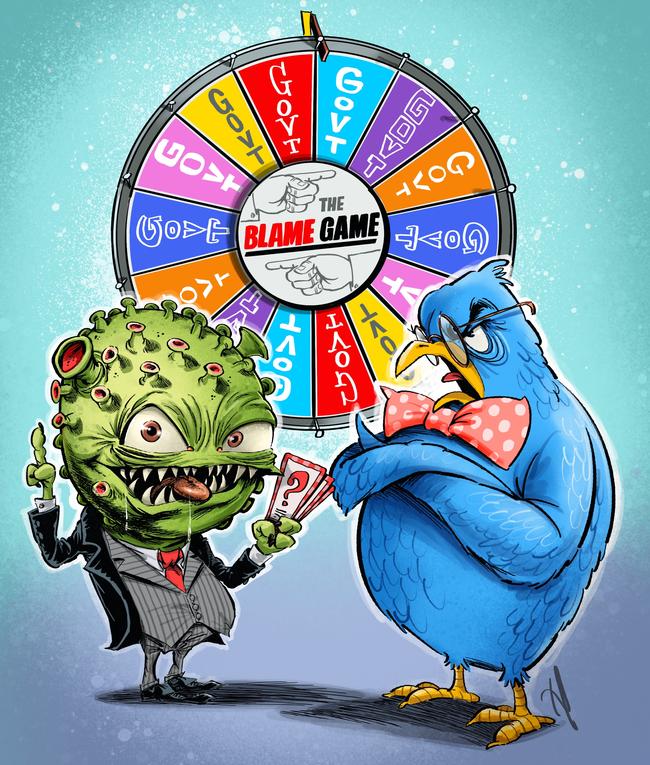Erin Molan: We need to take personal responsibility and stop blaming the government
Pointing the finger at someone else seems to be a national pastime and, in the case of the pandemic, there is no easier target than the federal government, writes Erin Molan.

Opinion
Don't miss out on the headlines from Opinion. Followed categories will be added to My News.
“A problem shared is a problem halved”, the old saying goes. These days, it’s more likely that “a problem blamed on someone else” is a problem halved.
A quick scroll of media and our daily interactions reinforces this concept that whatever is happening, there must always be someone held accountable.
Things don’t just “happen” any more. Any development in our lives can, and must, be traced back to some nefarious human actor who caused our misfortune.
For those inclined to play the blame game, the onset of an unprecedented, once-in-a-century global pandemic has provided fertile ground. And, of course, the easiest target? The government.
Not just the feds, but the states and territories too.

Those on all sides of politics have borne frequent accusations of blame — both warranted and unwarranted — over the past few years.
Recent events in the nation’s capital have reinforced the difficulty of reasoning with those intent on finding someone to blame.
To the tens of thousands who marched upon Parliament House to protest vaccine mandates, exercising their absolute democratic right to do so, it didn’t matter that the federal government has only ever supported very narrow mandates for aged care, disability and high-risk health workers. The broadscale mandates many object to were imposed by their respective state or territory leaders.
However (perhaps to the relief of those leaders), it seems that all roads of blame currently lead to Canberra and, specifically, to PM Scott Morrison.
This is not to say that we shouldn’t hold government to account — this is what I do as a journalist and what every citizen should do at election time.
Undoubtedly, there are areas of our nation’s Covid response in which governments (on all sides of politics) could have performed better, and have already admitted that themselves. However, in this blame culture, there is immediate judgment, minimal tolerance and no patience to give our governments the chance to fully implement their planned policies before we criticise them.
Ultimately, we all end up losers when we have governments too focused on how policies will look, and what blame might get levelled for them, rather than whether they will work.

The psychology behind blame is quite fascinating. Like everything, new technology and forms of media have exacerbated and accelerated it, but playing the “blame game” is nothing new. In fact, it was alive and well during the bubonic plague in the 14th century.
Robert Hoffmann, Professor of Economics and Chair of the Behavioural Business Lab at RMIT University, has studied this in detail, and identifies several reasons why we seem to be blaming government for, well, basically everything.
In some cases, it’s because the government might be legitimately blameworthy, and fair enough too. At both state and federal levels, we can all pinpoint several examples of mismanagement that exceed what you would reasonably expect in a well-resourced, properly functioning bureaucracy.
Then there’s “false blame”. As Professor Hoffmann explains, the world is an increasingly complex place, where interdependencies and cause-and-effect are nearly impossible for experts to understand, let alone everyday punters. Amid this uncertainty, having someone to blame is reassuring, with government the most visible and easy target.
This ties into the individual psychological element of “cognitive dissonance”. According to Professor Hoffmann, an individual’s thought process goes something like this: “I’m a good person. I haven’t done anything wrong, but bad things are happening to me. The only reasonable explanation is that something out of my control has failed – and the government is the obvious candidate to blame.”
Social aspects and “going along with the flow” also play a part here. It’s cool to blame the government. Everyone else is doing it.
And, finally, there is “hindsight bias”, which is surprisingly prevalent during Covid, despite no one having seen this pandemic coming.
Retrospectively, people believe they knew something was going to happen, so when the government doesn’t arrive at that same conclusion, or overtly takes actions in anticipation of this as-yet-unknown event, they can’t understand why.
We are all guilty, in all aspects of our lives, of seeing things much clearer in the rear-vision mirror. But rarely have we been required to take proactive action in the face of those unknowns, and never with the stakes so high.
Why anyone would enter politics right now is beyond me. I say this as someone who recently considered an incredible opportunity to run in this upcoming election and as someone who cares deeply about Australians and wants to make a difference.
We need the best people in politics for the prosperity of this nation but the vile nature of attacks, both internally and externally – the personal nature of them, and just the general toxicity – would be enough to put even the most enthusiastic of us off. And I’m no delicate petal.
I’m pretty battle hardened, as has been widely reported, plus I work in breakfast radio in Sydney, which can be brutal. But I’d take it over politics right now EVERY day of the week.
I am no apologist for governments, and will continue to publicly hold them to account when I consider it warranted. If mistakes are made by those charged with serving and protecting us, and we pay the price, then we should apportion blame fairly and legitimately.
However, if the “blame game” is to be productive, we must rationally examine the issue and satisfy ourselves that those being targeted both had accountability and performed the relevant action (or inaction).
Blaming someone else always makes us feel better. But perhaps the worst thing about blame culture is its minimisation of the role of the individual.
Australia’s Covid fate won’t be determined by which government is in power, of which persuasion. Rather, it comes down to millions of individuals making choices every day to do what’s right.
If we don’t, then we only have ourselves to blame.



